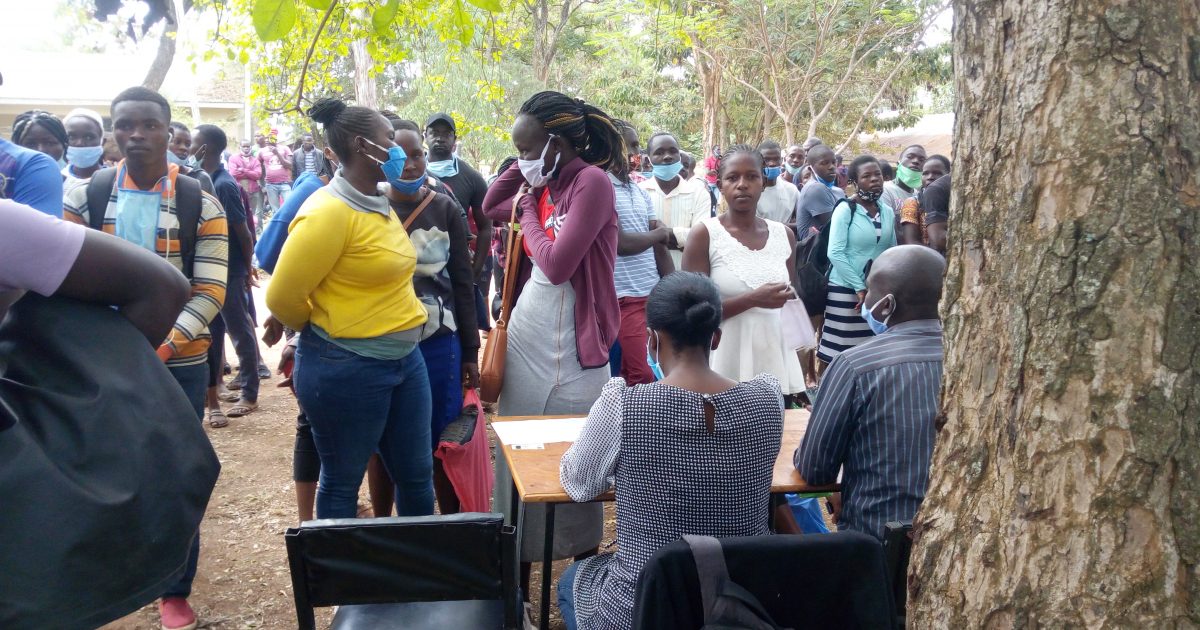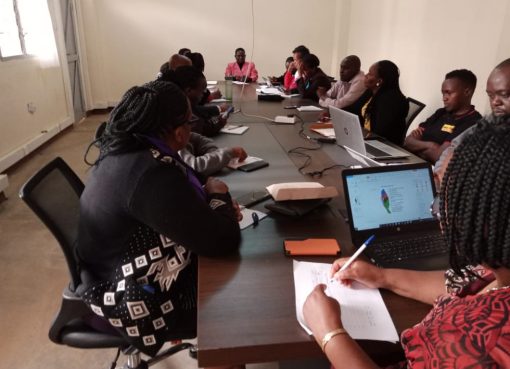It is 6 am in Bondo town and as residents of Abindu estate wake up to start the day, Marion Achieng a teacher at a local private school prepares breakfast of boiled maize and strong tea for her young family before leaving the house at half past the hour.
On a usual day, Achi as she is commonly referred to by her neighbours, dresses in decent skirts and blouse and carries a long her heavy handbag which presumably contains books and other paraphernalia used for class work.
On this particular day however, Achieng is dressed differently. She is dressed in a tight dark blue jeans trouser, a light brown t-shirt and a black baseball cap. On her feet, she has knee high black gumboots and grabs a pair of blue gloves and a slasher just as she leaves her two roomed house to eke a living for her family.
“This is what I have to do for now to support my people since my husband was laid off from a hotel job in March this year following the outbreak of corona virus,” says Achieng.
The mother of two children aged 2 and 4 years is one of the many private school and Board of Management (BOM) teachers who have been rendered jobless by Corona virus pandemic and have been recruited among the five hundred and sixteen youths in Bondo Sub County for Kazi mtaani phase two initiative.
Acting Bondo deputy county commissioner Mr. Michael Too revealed that 60% of those who applied to do the manual jobs are female youths from different professional backgrounds.
Too stated that although the program was designed for unemployed youths, many youths who have been in the teaching profession especially from private sector, or employed by B.O.M, applied and have been recruited for the jobs.

Achieng just like her new colleagues David Agot and Brian Otieno who are also teachers in their respective schools says life has been very difficult since her pay was stopped five months ago.
“Life has been very hard because it’s a struggle to pay rents and put food on the table if there is no income in the family. It has been a challenge to get treatment in hospital since our NHIF payment is in arrears and we are required to pay cash for treatment,” Achieng disclosed.
The 25-year-old teacher states that the Kazi mtaani has come as a relief to her as her desperate situation had pushed her to do anything to put food on the table.
“I was ready to do anything to earn a living but thanks for this initiative by the government, I will be able to buy food and pay some bills at least for the next six months as we wait for schools to reopen,” she said
Otieno who is a B.O.M teacher in one of the Top secondary schools in Usenge division mirrors Achieng’s predicaments.
He discloses that he felt a bit uneasy when he had to jostle for recruitment for the manual jobs together with some of his former students but had to swallow his pride in order to survive the hard times.
“It was a bit awkward during recruitment as some of my students were calling me “mwalimu” on the line. I hard to put on a “strong face” because I know too well pride will not pay my bills.
Agot who also works in a private schools in Ramba area disclosed that his extended family who relied on him for support have suffered since he can no longer support them financially.
He says he had no option but to seek employment from the Kazi mtaani initiative to keep his big family a float.
“I can’t choose a job. So long as I can earn a living to keep us going I will do any job,” Agot stated.
Agot says that unlike other people who would feel embarrassed doing manuals jobs which are perceived to be for school drop outs he is not ashamed.
“I will be cleaning trenches and clearing bushes in estates where by students live but I have nothing to be ashamed about. Infact it will be an opportunity to teach them not to choose jobs and to have a positive attitude towards anything they do in life,” Agot said.
Siaya county private schools association chairman of Joseph Obonyo on his part sees things differently.
Obonyo says that while he appreciates that the Kazi Mtaani is helping desperate teachers put food on the table, the situation has forced the teachers to lower their dignity and the government could do better to cushion such teachers.
“Teachers employed by private institutions and those under B.O.M supplement the work of those employed by the government and there should have been a better arrangement to support them since everyone is a tax payer,” Obonyo said.
Obonyo disclosed the government has remained mum on the request by the National Private schools’ association of Shs.7 billion grant that would have helped them cushion the desperate teachers.
“We put in a request of Sh7 billion grant from the government to help cushion private schools not only in paying teachers but also other staff as well as statutory deductions like NHIF but there is no response two months down the line. We need to be considered just like artists and the youths have been considered,” said the former TSC commissioner.
He on the other hand asked private schools to venture into income generating activities so that they can survive future calamities that threaten to push them out of business.
“It is high time private schools stop depending on school fee payment alone. They school venture into agriculture and real estate so that they are not caught out in future,” Obonyo said.
He also challenged all the schools to learn from the current pandemic and invest in ICT programs so that they are able to deliver their services through modern technology.
“For every problem there is a silver lining, because of this pandemic, we have to learn and rethink our strategies by investing and adopting ICT as a mode of teaching in our schools going forward,” Obonyo said.
In May this year, President Uhuru Kenyatta launched the National Hygiene Program-Kazi Mtaani Initiative at a tune of Sh 10 billion to cushion the unemployed youth against effects of Corona Pandemic.
By Brian Ondeng’




